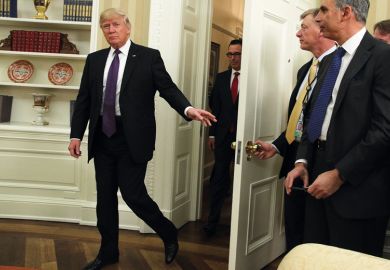US colleges have been warned against infringing antitrust laws following claims of joint plans to cancel open houses for foreign students.
An alleged meeting between colleges is being cited by one lawyer as a warning to institutions that coordination among competing businesses – even if meant to be helpful at a time of great societal stress – could potentially break the law. However, one key higher education figure said they had no knowledge of such a meeting taking place.
“People just don’t understand where the line is for antitrust,” said the lawyer, Ethan Litwin of Constantine Cannon, a New York-based law firm specialising in antitrust cases.
Mr Litwin said he had learned some limited details of a meeting that allegedly occurred in early March, just as US universities were beginning to shut their campuses to prevent wider spread of Covid-19.
The alleged meeting, supposedly involving at least four institutions, may well have had noble intentions, Mr Litwin said. The participating university administrators likely didn’t want to risk the health of their staff and their applicants by scheduling such meetings with foreign students, and simply wanted to be sure that no institution had to fear others taking advantage of the medical emergency, he said.
But without specific exemptions from Congress, Mr Litwin said, federal law forbids such coordination among parties in financially competitive situations, and carries severe penalties for violations.
And even discussions that begin with pure motives can easily spill over into discussions of other institutional actions that carry less ambiguous anti-competitive implications, he said.
Mr Litwin, in a blog posting on his law firm’s website, detailed possible examples that could arise during the current coronavirus pandemic, such as questions of whether colleges should refund tuition or at least discount it for having shifted students into online classes.
Few, if any, seem to have done that, which would be an especially clear and substantive legal violation if the ongoing lack of tuition refunding was coordinated in any way, he noted.
Mr Litwin said it was unclear whether the university representatives at the alleged early March meeting reached any actual agreement to postpone any open houses for students. Either way, he said, the matter was made moot by the rapid shutdown of universities nationwide in the middle of March.
Representatives of the US Justice Department, and of several universities in the US, and major university associations, all either declined or did not respond to requests for comment on the reported meeting or its implications.
Terry Hartle, the senior vice-president for government and public affairs at the American Council on Education, said he heard nothing of any such meeting. Asked if this seems a moment to warn universities of the potential legal dangers when they might be tempted to reach out to each other for guidance, Dr Hartle said: “It seems like a moment when people are struggling very hard to figure out how to respond to an unprecedented situation.”
The alleged meeting came just a few months after another antitrust-related event – ahead of and unrelated to the wide coronavirus outbreak – in which the Trump administration forced US colleges to abandon their long-established calendar of dates for when they notify applicants of their acceptance and for when the students must reply and confirm.
The guidelines were set by the National Association for College Admission Counseling, in what it described as a model of good ethical practices. Federal antitrust lawyers disagreed, pushing colleges into what some now fear will be a “Wild West” of institutions bidding for students who already have agreed to enrol elsewhere.
Professional associations in various industries, with or without nefarious intent, are often the chief coordinators of anticompetitive behaviour, sometimes acting in plain sight, Mr Litwin said.
An emergency such as a pandemic raises the temptation levels, and colleges seem especially vulnerable to wishful thinking on the matter, he argued.
“For better or worse, folks in the educational field think that what they do is so important on a societal level that they’re exceptional, and that the ordinary rules just shouldn’t apply to them,” he said. “And none of that’s true, so it’s very easy for anyone who thinks like that to get into trouble.”
Register to continue
Why register?
- Registration is free and only takes a moment
- Once registered, you can read 3 articles a month
- Sign up for our newsletter
Subscribe
Or subscribe for unlimited access to:
- Unlimited access to news, views, insights & reviews
- Digital editions
- Digital access to THE’s university and college rankings analysis
Already registered or a current subscriber?



